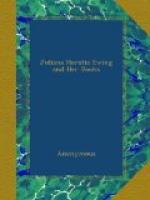It is very good, isn’t it?—and he is mending the fire during this outburst, and keeps piling coal on coal as he warms with his subject.
I must also just throw you two quotations from Macaulay’s most interesting Life and Letters. Quotations within quotations, for they are extracts.
“Antoni Stradivari has an
eye
That winces at false work and loves the true.”
(BROWNING.)
“There
is na workeman
That can both worken wel and
hastilie
This must be done at leisure
parfaitlie.”
(CHAUCER.)
By the bye, the italics in Black’s quotations are mine. Good wording I think.
But how one does go back with delight to Scott! I confess I think to have written the Heart of Midlothian is to have put on record the existence of a moral atmosphere in one’s own nation as grand as the ozone of mountains. WHAT a contrast to that of French novels (with no disrespect to the brilliant art and refreshing brain quickness of the latter); but Ruskin’s appeal to the responsibility of those who wield Arts instead of Trades recurs to one as one under which Scott might have laid his hand upon his breast, and looked upwards with a clear conscience....
March 16, 1880.
* * * * *
I quite agree with you about an artlessness and roughness in Scott’s work. I thought what I had dwelt on was the magnificent tone of the H. of Midlothian. Also he has two of the first (first in rank and order if not first in degree) qualifications for a writer of fiction—Dramatism and individuality amongst his characters. He had (rather perhaps one should say), the quality which is nascitur non fit—Imagination. It is the great defect, I think, of some of our best modern writers. They are marvellously FIT and terribly little NASCITUR. It is why I can never concede the highest palm in her craft to G. Eliot. Her writing is glorious—Imagination limited—Dramatism—nil!




